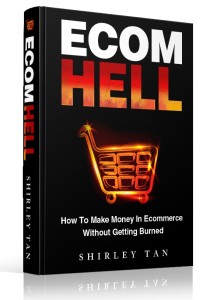For prospective merchants that think starting an ecommerce business is easy, Shirley Tan disagrees. She has the experience to disagree, having founded her first ecommerce site in the 1990s, which became a market leader, and which she later sold. Her new book, Ecom Hell, describes what it takes — from the trenches — to successfully run an ecommerce business.
We spoke recently with Shirley Tan.

Shirley Tan
Practical Ecommerce: You’re an ecommerce pioneer. Your new book is Ecom Hell, a provocative title. Why did you write it?
Shirley Tan: “I wrote it for folks who are just starting out in ecommerce. My point of view is that the real work in ecommerce starts after the customer places the order. Everything leading to that, all the marketing, all the search engine optimization, web design, all of those are completely important. But, at the end of the day, the customers care about getting their goods. It’s the post-sale customer experience that is important.
“I wanted the new entrepreneur coming into this space to get a really good comprehensive idea of what it’s going to take to not just start but to run and grow the business. Sometimes, it can be hell, when people don’t start off on the right foot.”
PEC: You founded, AmericanBridal.com in the 1990s. You grew that to be a dominant retailer of wedding products, before selling it in 2009. What is the state of ecommerce now?
Tan: “The current state of ecommerce is very tough. I tell my clients it’s Amazon’s world. They’re the big gorilla in this space. They’re everywhere. They seem to sell everything. What can new ecommerce merchants, even the people who have been in ecommerce a long time, what can they do to really differentiate themselves?
“The margin for error is shrinking. People have to really be on top of it. They have to really just pick a path and work all the leverages that they can to become successful. But, it’s definitely a very fierce landscape. No doubt.”
PEC: Tell us more about your ecommerce experience.
Tan: “I started off as a retailer in the late 80s. I did this when I was in college. I was just a typical retailer, with a brick-and-mortar store. In the early 90s, I started a mail order catalog, and hated it. Hated it. It was a lot of work. When online came about in 1996 and I registered the domain name, put up a website on the Yahoo! store platform, and didn’t know what I was doing. It really took a backseat to the retail store as well. I think it took me a really long time to figure out what the online business was about.
“I sold the brick-and-mortar side of the business to my partner in 2004 and took over the online and focused all my energy on that component, AmericanBridal.com. I sold it in 2009. By then, we had a total of seven websites. We also had bits and pieces of a wholesale company that didn’t do well. It wasn’t all 100 percent home run, but overall I consider it to be a pretty good achievement.”
PEC: Tell us about your new business, Ecommerce Systems.
Tan: “I took some time off after I sold American Bridal. I really had some soul searching for what I want to do. What am I still passionate about? I really do love the ecommerce space. I like the marketing piece. I like the strategy. I like growing businesses. At heart, I’m a merchant. These days, I’m helping small businesses. It gives me a lot of satisfaction to be able to still do that — to be able to contribute in that way.”
PEC: There are folks reading this that may be contemplating launching their own ecommerce business, or a new facet of their current business. What’s your advice to them?
Tan: “The biggest thing is — even if you have an existing business and you’re thinking about branching off to a different niche — there are three things to remember.
“First, focus on a compelling message. What is this new company going to be about? If you’ve done it before, how is it going to be different from your previous businesses? Who would be the audience — not just the demographics. Who are the customers that are most likely to buy from you? Why? What do you have in common with them? Focus on a compelling message of who you are and who you’re not. You need to go after that crowd. Share your values and go after them with a vengeance. That’s number one.
“The second thing is to nail down your product. If you have only one vendor and that resource goes away, then what? You’ve invested all this money in a website, in perhaps an infrastructure, a back end, and you pin your whole entire strategy on that this supplier is going to come through for you. That’s too many eggs in one basket. It’s best that you have more control over the goods. Meaning that it’s either your design, you’re making it, or you have some kind of intellectual property to it, so that you control the fate of your goods. Otherwise, it’s just a commodity. Everybody sells commodities, right? The margins are slim. It’s competitive. The next guy will just lower the price just to make the sale. It’s like a race to the bottom.
“Third, people hear this all the time but it’s true. Be passionate. It’s not absolutely crucial, but it helps. For example, a friend is thinking about getting into ecommerce, I asked her, ‘Why do you want to do this?’ She said, ‘Well, I can make some money. I don’t know anything about this space.’ I find that to be problematic. She’s my friend. I’m trying to be gentle. But she’s thinking of quitting her corporate job and putting some money into this. I’m scared for her. The passion part helps you get out of bed in the morning. It helps you when customers are yelling at you or when you’re having a rough day or when your employees let you down. Passion helps get you out of bed and keeps you going.”
PEC: Your new book is Ecom Hell. Where can someone buy it?
Tan: It’s available on Amazon — I self-published it — in print and digital, as an ebook. If you’re a Amazon Prime member and you have a Kindle, you can borrow it from the library for free. Or it’s $6.99 for the Kindle version.”
PEC: Any other thoughts?
Tan: “A lot of people — big companies, small companies — they’re all thinking of the next hot popular product. They want to be the next iPhone. But it’s more important to focus on the excellent service. Add value to the customers, because consumer products come-and-go. Products can be knocked off. It’s only as good as the next knock-off or the next mark down, or in terms of pricing game.
“But, what if you could win over your customers’ hearts? What if you can win over a mind share, so consumers think of you to solve problems, not sell products? If that is what they think of your company, it is just as good as printing money.”






